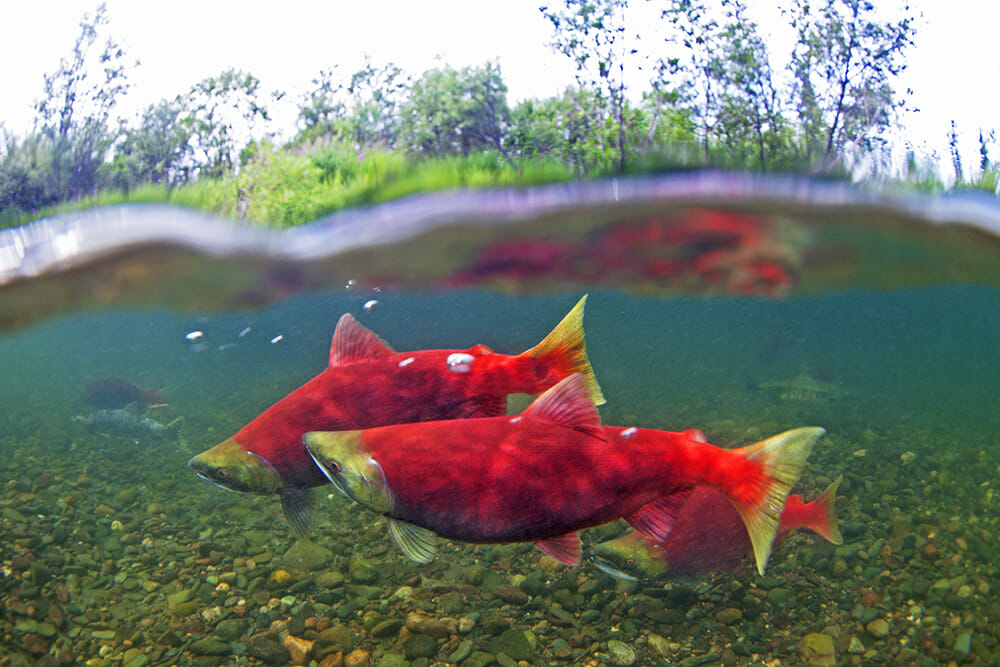
The lawsuit defies a strong science record and overwhelming support for Clean Water Act 404(c) protections by Bristol Bay residents, Alaskans and anglers
Contacts:
- Nelli Williams, Alaska Director, Trout Unlimited 907-230-7121, nelli.williams@tu.org
ANCHORAGE, Alaska – Today, the State of Alaska filed a lawsuit against the Environmental Protection Agency (EPA) in U.S. Supreme Court, attempting to block Clean Water Act safeguards for the headwaters of Bristol Bay that were recently finalized by the agency. Mining in Bristol Bay would harm its bountiful runs of salmon which are essential to the culture and way of life for many local residents and support jobs and a thriving fish-based economy.
“This lawsuit is out of touch with Alaskans and unwarranted. Alaskans have been unwavering in their opposition to the proposed Pebble Mine because of its well-documented threat to Bristol Bay’s world-renowned salmon fishery. The Governor is ignoring Alaskans and science with this lawsuit. And even more appalling, he is using public funds to prop up out-of-state mining executives at the expense of Alaska’s salmon and all the people who rely on them. It’s anti-Alaskan,” said Nelli Williams, Trout Unlimited’s Alaska director based in Anchorage.
Trout Unlimited has been working to safeguard Bristol Bay from the threat of the Pebble Mine for the past two decades.
“We will continue to work alongside local partners to defend existing protections and advocate for long-term safeguards that protect Alaskan jobs, fishing opportunities and ways of life,” Williams added.
Background:
This is not the first lawsuit filed to try to stop Clean Water Act 404(c) safeguards from protecting Bristol Bay’s world class fisheries. At the request of Bristol Bay Tribes, commercial fishermen and lodge owners, the EPA initiated the Clean Water Act process in 2010. After a multi-year review, the EPA produced the Bristol Bay Watershed Assessment in 2014. This found that mining in the Pebble deposit area would have unacceptable adverse impacts to the fishery. The EPA released a 404(c) Proposed Determination limiting mine waste discharge in the region shortly thereafter. Pebble brought a lawsuit against the EPA at that time that required the EPA to pause work on finalizing a 404(c) ruling and eventually ended in a settlement. The settlement allowed PLP to apply for its Clean Water Act 404 permit in 2017, which was denied by the Army Corps of Engineers in 2020 for failing to meet Clean Water Act standards.
In 2019, the Trump Administration EPA began the process to withdraw the 2014 404(c) Proposed Determination. Trout Unlimited sued the EPA over this politically motivated and scientifically lacking decision. The 9th Circuit Court of Appeals sided with Trout Unlimited and ruled that the case against EPA to reinstate proposed Clean Water Act protections can proceed. The EPA announced that it would move to vacate its 2019 decision to withdraw proposed protections for Bristol Bay and reinstate the agency’s earlier 2014 Proposed Determination. Pebble Limited Partnership chose to not intervene during this lawsuit.
The EPA issued a Clean Water Act 404(c) Final Determination for Bristol Bay on January 31, 2023, which prohibits and restricts mine waste discharge within the Pebble Deposit area. The EPA carried out the regulatory process along the timeline outlined by the Clean Water Act, including issuing a Recommended Determination for Bristol Bay on December 1, 2022. The Recommended Determination followed its May 2022 Proposed Determination to protect the Bristol Bay watershed. The EPA received more than half a million comments, including record breaking comments from Bristol Bay residents and Alaskans, who supported the Proposed Determination and requested that EPA finalize protections as soon as possible during the height of the 2022 fishing season. In the 50-year history of the Clean Water Act, EPA has used this authority judiciously; Bristol Bay is the 14th use for 404(c) safeguards by EPA.
###
Trout Unlimited, the nation’s oldest and largest coldwater fisheries conservation organization, is dedicated to caring for and recovering America’s rivers and streams, so our children can experience the joy of wild and native trout and salmon. Across the country, TU brings to bear local, regional, and national grassroots organizing, durable partnerships, science-backed policy muscle, and legal firepower on behalf of trout and salmon fisheries, healthy waters and vibrant communities. In Alaska, we work with sportsmen and women to ensure the state’s trout and salmon resources remain healthy far into the future through our local chapters and offices in Anchorage and Juneau.

